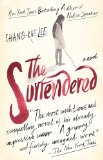Summary | Excerpt | Reading Guide | Reviews | Beyond the Book | Readalikes | Genres & Themes | Author Bio

Critics' Opinion:
Readers' Opinion:
First Published:
Mar 2010, 480 pages
Paperback:
Mar 2011, 496 pages
 Book Reviewed by:
Book Reviewed by:
Judy Krueger
Buy This Book
A few days earlier June and her siblings had stayed a night in a house no bigger than twenty square meters with nearly thirty others, including the old farmer and his wife, who slept in the corner next to a locked chest of their things. It was raining heavily that day, and when someone spotted what looked like a house at the foot of a hill a few people began to run for it, and then others, and soon enough scores. But it was far in from the road and the three of them were fast and reached the house in the first wave. The farmer had attempted to camouflage it with a makeshift cover of netting and reeds and then appeared out front holding a pitchfork, but he pointed the tines downward when he saw it was no use. The force of numbers held for even the weak and the ragged. The crowd pushed in until the small house was full, the others having to hike back to the road and continue their sodden march.
All the farmer and his wife could do was to make certain that they themselves had a space for the night. They were shrewd to share some of their food in the hope that all of it wouldn’t simply be taken. Without any prompting, his wife quickly made a large pot of barley porridge and everyone got a half-cup; the three of them had one tin mug between them and June begged the farmer’s wife to fill it to the brim, which she did. They took turns taking swallows while sitting jammed in among the rest of the horde, everyone sitting cross-legged and knee to-knee. Only the smallest children could curl up or recline. Everyone was soaked from the rain, and the smell of so many wet, long-unwashed bodies in the enclosed space was fierce, the air of the single room quickly stifling and sour with an overwhelming humidity, and soon someone asked June to open the window, which was right above them. After eating, she took out a tortoiseshell comb of her mother’s and ran it through her siblings’ hair; she had noticed before the rain began in the morning how whitish their heads appeared and so combed through to remove the sheets of clinging lice. She flicked them out the window. It was futile work, of course, for she had no special soap to kill the eggs and they would simply multiply, besides the fact that the other people there were equally infested, but now that her mother and older sister were gone it was she who had to keep the little ones safe, keep them as sound as she could, and so whenever she had a chance June wiped their faces, or rubbed their teeth and gums with mint leaves, fed them whatever she could scrounge or barter for, offering them as much as she could without growing too weak herself.
She was always a responsible, filial daughter and, as she was closest in age to the twins, had looked after them for as long as she could remember. It happened that her older brother and sister were also twins and their family had always seemed to comprise her parents and just three children, instead of five, June ever slightly removed from their naturally unitary play. It was a system of orbit that had seemed unlucky to her at first but in fact suited her burgeoning character, something her gentle, thoughtful father recognized. He was a respected schoolteacher in their town, and he often told her that there was great strength in her singularity, that she ought to revel in it, an idea that she would see as bitterly ironic years later, when he was falsely denounced as a Communist in the first disastrous, terrifying days of the war.
She combed her own short hair and saw that hers was rife with lice, too, and her sister Hee-Soo offered to do it for her, and she let her. A few of the men lit cigarettes and others began talking. The conversations centered at the start on the rumored movements of the forces (the Americans were advancing quickly north now, the North Koreans reportedly retreating pell-mell), on which were the best refugee camps, on lost family members, but then soon enough turned to subjects like the rain, the recent trend of weather, if the pears and persimmons would be ready by now (if there was any remaining fruit on the trees, if there were any trees at all), the best remedies for certain body aches, all the blithe, everyday talk that might keep at bay for a moment the staggering reality of the dismantled world outside.
Excerpted from The Surrendered by Chang-rae Lee. Copyright © 2010 by Chang-rae Lee. Excerpted by permission of Riverhead Books. All rights reserved. No part of this excerpt may be reproduced or reprinted without permission in writing from the publisher.





The House on Biscayne Bay
by Chanel Cleeton
As death stalks a gothic mansion in Miami, the lives of two women intertwine as the past and present collide.

The Flower Sisters
by Michelle Collins Anderson
From the new Fannie Flagg of the Ozarks, a richly-woven story of family, forgiveness, and reinvention.

The Funeral Cryer by Wenyan Lu
Debut novelist Wenyan Lu brings us this witty yet profound story about one woman's midlife reawakening in contemporary rural China.
Your guide toexceptional books
BookBrowse seeks out and recommends the best in contemporary fiction and nonfiction—books that not only engage and entertain but also deepen our understanding of ourselves and the world around us.